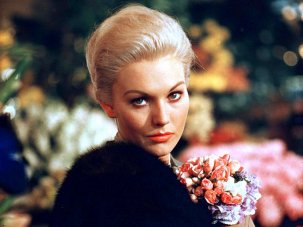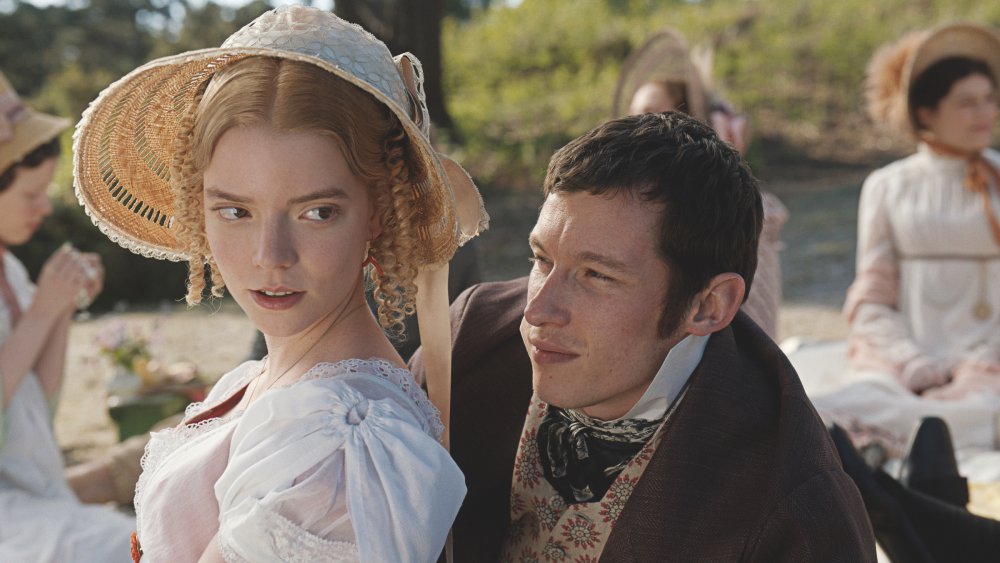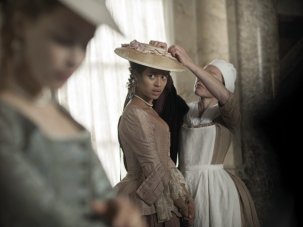“I always deserve the best treatment because I never put up with any other,” observes charming control freak Emma Woodhouse, in Jane Austen’s novel. She’s treated positively splendidly in first-time director Autumn de Wilde’s smart, sumptuous but snarky adaptation, which serves up Austen’s frothiest romantic comedy as an Instagram-ready romp.
UK 2020
Certificate U 124 mins approx
Director Autumn de Wilder
Cast
Emma Woodhouse Anya Taylor-Joy
Mrs Elton Tanya Reynolds
Mr Elton Josh O’Connor
George Knightley Johnny Flynn
Mr Woodhouse Bill Nighy
Frank Churchill Callum Turner
Miss Bates Miranda Hart
UK release date 14 February 2020
Distributor Universal
universalpictures.co.uk/emma
► Trailer
Rather than execute a bold millennial makeover, like the also much adapted Little Women, Emma revels in the class-conscious chain of romantic misunderstandings of Austen’s original. Unabashedly a style-led movie, it gifts Emma a Regency doll’s-house world of ravishing country estates with vast drawing rooms in sugar-almond hues, all wrapped in manicured parkland. Anya Taylor-Joy’s pert, appropriately doll-like Emma undertakes her meddling and matchmaking in costume designer Alexandra Byrne’s exquisitely detailed muslins and Empire-line pastel silks. Not since Marie Antoinette (2005) have the idle rich looked so appetising – though next to The Personal History of David Copperfield’s colour-blind casting, they also look very white indeed.
Despite de Wilde’s handsome, rigid compositions, which nod to her photography background, nimble cutting keeps the action fleet rather than heritage-cinema staid. So Emma’s plan to unite the malleable Harriet with oleaginous vicar Mr Elton snaps along, screenwriter Eleanor Catton’s short scenes and perky dialogue mining the relentless social rounds and snobberies of rural society for comedy. Her most successful seam is female chatter – the touchingly dull twitter of Miranda Hart’s spinster Miss Bates, or the spiteful social point scoring of Mr Elton’s new wife (a preening Tanya Reynolds).
A resolutely stylish, sharp-edged film, it has brittle spots, one of them Taylor-Joy’s Emma, initially a snobbish queen bee with a mean streak. Her bickering romance with old friend Mr Knightley (a captivated but irritated Johnny Flynn) erupts with a start at a ball, where you can feel the temperature flare between them in lingering eye meets, a hand trailing on her waist.
From here on in, the film has some emotional heft, the plot twists that separate them more bite. Shot in shallow focus, or prettily profile to profile, they’re gradually separated from the throng. Though the film doesn’t always foreground female friendship, despite Emma’s protestations, late on it tears her satisfyingly between love and loyalty. There’s barely a bat squeak of proto-feminism here, with marriage and a fine house presented as every woman’s holy grail, yet the headstrong and opinionated Emma feels empowered in a distinctly 21st-century manner.
-
The 100 Greatest Films of All Time 2012

In our biggest ever film critics’ poll, the list of best movies ever made has a new top film, ending the 50-year reign of Citizen Kane.
Wednesday 1 August 2012
-
The best films now on UK streaming services

Looking for the best new cinema releases available on British VOD platforms? Here’s our guide to how to keep up with the latest movies while you’re...
-
The Digital Edition and Archive quick link
Log in here to your digital edition and archive subscription, take a look at the packages on offer and buy a subscription.






